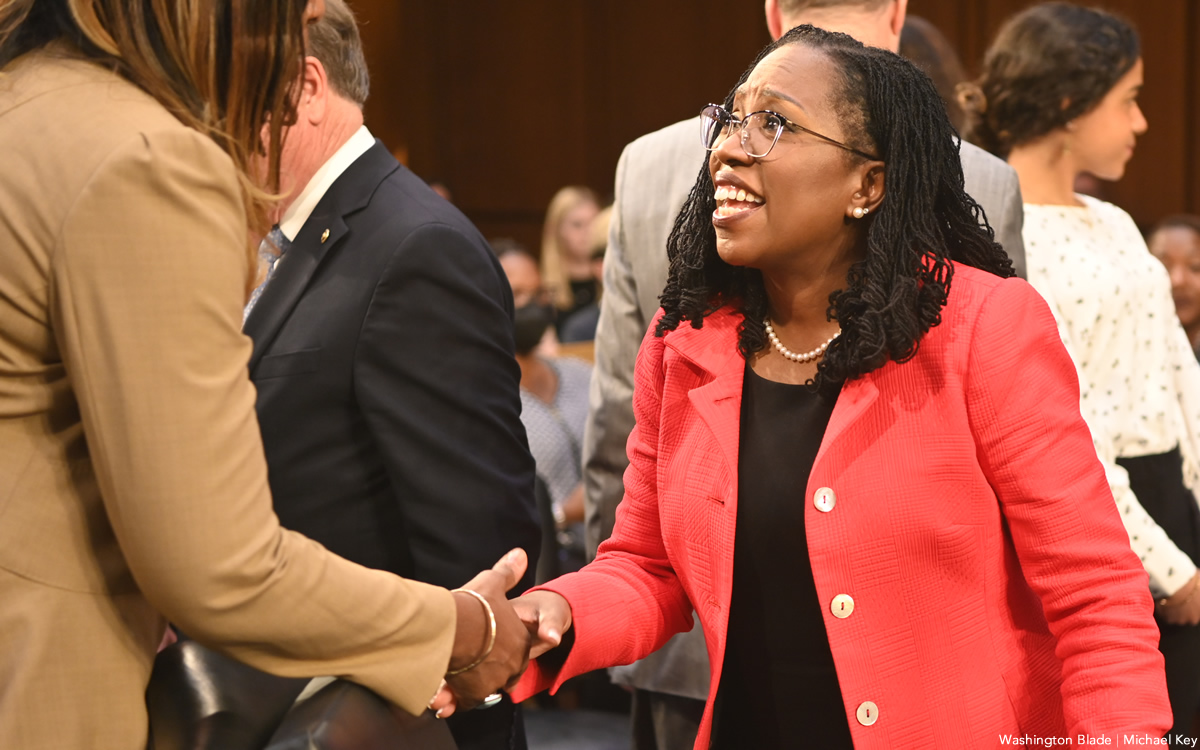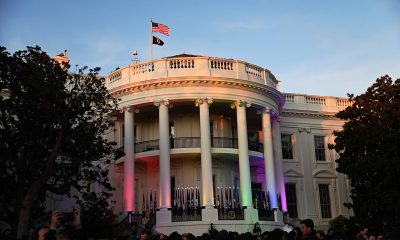U.S. Supreme Court
Ketanji Brown Jackson sworn in as first Black woman Supreme Court justice
Roe v. Wade struck down last Friday

Ketanji Brown Jackson was sworn in Thursday as the newest member of the U.S. Supreme Court, representing a welcome change on the bench for progressives who are still outraged after the decision last week overturning the right to abortion found in Roe v. Wade.
Jackson, who’s now the first Black woman to serve on the high court, has replaced Justice Stephen Breyer, a Clinton appointee who is retiring upon the end of the Supreme Court’s term. Breyer announced his forthcoming departure months ago as progressives urged him to stop to ensure a replacement appointed a Democratic president and confirmed by a Democratic Senate.
The briefing swearing-in was conducted by Chief Justice John Roberts, who administered the oath of office for Brown before a small gathering of Jackson’s family, including her two daughters, according to a report in the New York Times.
GLAAD CEO Sarah Kate Ellis said in a statement the beginning of Jackson’s tenure on the Supreme Court “will bring long-needed representation to the Supreme Court at a critical juncture in our nation’s history, and after the court’s disastrous term dismantling personal liberty.”
“It bears repeating the obvious that women, people of color and LGBTQ people are Americans deserving of equal protection under law,” Ellis said. “Justice Jackson will be a visible and inspiring presence on a court currently dominated by extremists, reminding all that America should always be moving forward to expand freedom.”
U.S. Supreme Court
US Supreme Court rules Idaho to enforce gender care ban
House Bill 71 signed in 2023


BY MIA MALDONADO | The U.S. Supreme Court has allowed Idaho to enforce House Bill 71, a law banning Idaho youth from receiving gender-affirming care medications and surgeries.
In an opinion issued Monday, the U.S. Supreme Court granted the state of Idaho’s request to stay the preliminary injunction, which blocked the law from taking effect. This means the preliminary injunction now only applies to the plaintiffs involved in Poe v. Labrador — a lawsuit brought on by the families of two transgender teens in Idaho who seek gender-affirming care.
Monday’s Supreme Court decision enforces the gender-affirming care ban for all other trans youth in Idaho as the lawsuit remains ongoing in the Ninth Circuit Court of Appeals.

The American Civil Liberties Union and the ACLU of Idaho, both of whom represent the plaintiffs, said in a press release Monday that the ruling “does not touch upon the constitutionality” of HB 71. The groups called Monday’s ruling an “awful result” for trans Idaho youth and their families.
“Today’s ruling allows the state to shut down the care that thousands of families rely on while sowing further confusion and disruption,” the organizations said in the press release. “Nonetheless, today’s result only leaves us all the more determined to defeat this law in the courts entirely, making Idaho a safer state to raise every family.”
Idaho Attorney General Raúl Labrador in a press release said the state has a duty to protect and support all children, and that he is proud of the state’s legal stance.
“Those suffering from gender dysphoria deserve love, support and medical care rooted in biological reality,” Labrador said. “Denying the basic truth that boys and girls are biologically different hurts our kids. No one has the right to harm children, and I’m grateful that we, as the state, have the power — and duty — to protect them.”
Recap of Idaho’s HB 71, and what led to SCOTUS opinion
Monday’s Supreme Court decision traces back to when HB 71 was signed into law in April 2023.
The law makes it a felony punishable for up to 10 years for doctors to provide surgeries, puberty-blockers and hormones to trans people under the age of 18. However, gender-affirming surgeries are not and were not performed among Idaho adults or youth before the bill was signed into law, the Idaho Capital Sun previously reported.
One month after it was signed into law, the families of two trans teens sued the state in a lawsuit alleging the bill violates the 14th Amendment’s guarantee of equal protection under the law.
In late December, just days before the law was set to take effect in the new year, U.S. District Judge B. Lynn Winmill blocked the law from taking effect under a preliminary injunction. In his decision, he said he found the families likely to succeed in their challenge.
The state of Idaho responded by appealing the district court’s preliminary injunction decision to the Ninth Circuit, to which the Ninth Circuit denied. The state of Idaho argued the court should at least enforce the ban for everyone except for the plaintiffs.
After the Ninth Circuit’s denial, the Idaho Attorney General’s Office in February sent an emergency motion to the U.S. Supreme Court, the Idaho Press reported. Monday’s U.S. Supreme Court decision agrees with the state’s request to enforce its ban on trans health care for minors, except for the two plaintiffs.
******************************************************************************************

Mia Maldonado joined the Idaho Capital Sun after working as a breaking news reporter at the Idaho Statesman covering stories related to crime, education, growth and politics. She previously interned at the Idaho Capital Sun through the Voces Internship of Idaho, an equity-driven program for young Latinos to work in Idaho news. Born and raised in Coeur d’Alene, Mia moved to the Treasure Valley for college where she graduated from the College of Idaho with a bachelor’s degree in Spanish and international political economy.
******************************************************************************************
The preceding piece was previously published by the Idaho Capital Sun and is republished with permission.
The Idaho Capital Sun is the Gem State’s newest nonprofit news organization delivering accountability journalism on state politics, health care, tax policy, the environment and more.
We’re part of States Newsroom, the nation’s largest state-focused nonprofit news organization.
U.S. Supreme Court
Supreme Court appears skeptical of arguments to restrict abortion pill access
Decision expected by June

Hearing oral arguments on Tuesday in FDA v. Alliance for Hippocratic Medicine, the U.S. Supreme Court appeared skeptical of arguments to curtail access to the abortion pill mifepristone.
A decision in the case is expected to come in June. The court’s most conservative justices, Samuel Alito and Clarence Thomas, signaled their support for the anti-abortion plaintiffs, who seek to prohibit telemedicine prescriptions and distribution of the pill by mail.
A ruling in their favor could also undermine the ability of the U.S. Food and Drug Administration to exercise its expert judgment on the safety and efficacy of medications without interference by courts — which, by and large, are not qualified to adjudicate these questions.
Such concerns were relayed even by justices like Neil Gorsuch, who was appointed by former President Donald Trump, and who warned on Tuesday that the case might stand as “a prime example of turning what could be a small lawsuit into a nationwide legislative assembly on an F.D.A. rule or any other federal government action.”
Mifepristone was first approved in the year 2000. The drug, taken together with misoprostol, is the most commonly used method of terminating pregnancies in the U.S.
The justices’ questions also showed their skepticism toward plaintiffs’ arguments that concrete harms will result if the medication remains widely available. For instance, Gorsuch and Justice Ketanji Brown Jackson noted healthcare providers are already permitted to opt out of providing care to which they have moral objections.
Even if the Supreme Court rules in favor of the government, preserving access to mifepristone including through telemedicine and mail-order prescriptions, more than a dozen conservative states have banned the drug and implemented near-total abortion bans pursuant to the court’s 2022 decision in Dobbs v. Jackson Women’s Health Organization.
U.S. Supreme Court
Supreme Court declines to hear case over drag show at Texas university
Students argue First Amendment protects performance

The U.S. Supreme Court on Friday declined to hear a First Amendment case over a public university president’s refusal to allow an LGBTQ student group to host a drag show on campus.
The group’s application was denied without the justices providing their reasoning or issuing dissenting opinions, as is custom for such requests for emergency review.
When plaintiffs sought to organize the drag performance to raise money for suicide prevention in March 2023, West Texas A&M University President Walter Wendler cancelled the event, citing the Bible and other religious texts.
The students sued, arguing the move constituted prior restraint and viewpoint-based discrimination, in violation of the First Amendment. Wendler had called drag shows “derisive, divisive and demoralizing misogyny,” adding that “a harmless drag show” was “not possible.”
The notoriously conservative Judge Matthew Kacsmaryk, who former President Donald Trump appointed to the U.S. District Court for the Northern District of Texas, ruled against the plaintiffs in September, writing that “it is not clearly established that all drag shows are inherently expressive.”
Kacsmaryk further argued that the High Court’s precedent-setting opinions protecting stage performances and establishing that “speech may not be banned on the ground that it expresses ideas that offend” was inconsistent with constitutional interpretation based on “text, history and tradition.”
Plaintiffs appealed to the 5th U.S. Circuit Court of Appeals, which is by far the most conservative of the nation’s 12 appellate circuit courts. They sought emergency review by the Supreme Court because the 5th Circuit refused to fast-track their case, so arguments were scheduled to begin after the date of their drag show.
-

 State Department2 days ago
State Department2 days agoState Department releases annual human rights report
-

 Maryland4 days ago
Maryland4 days agoJoe Vogel campaign holds ‘Big Gay Canvass Kickoff’
-

 Politics3 days ago
Politics3 days agoSmithsonian staff concerned about future of LGBTQ programming amid GOP scrutiny
-

 The White House1 day ago
The White House1 day agoWhite House debuts action plan targeting pollutants in drinking water










